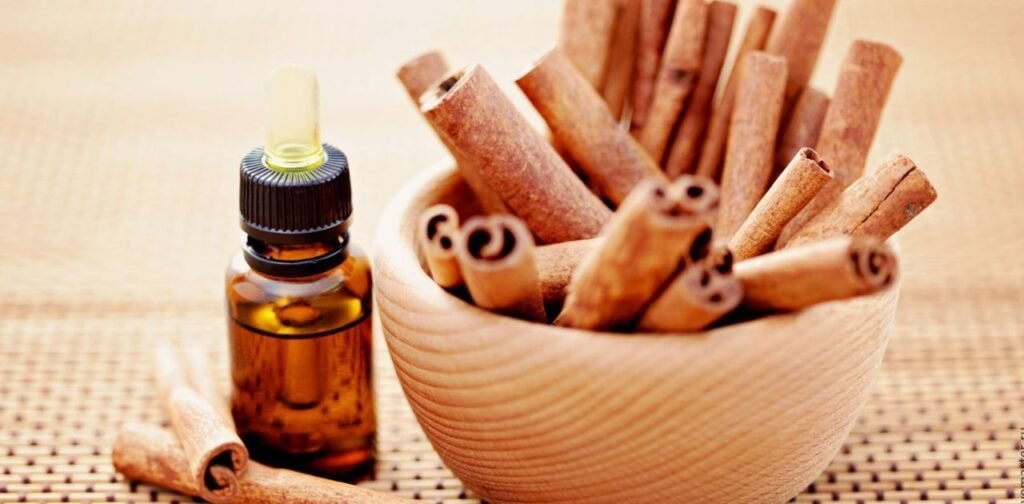Cinnamon and Oil Benefits, Uses, and How to Use Them Together

A large number of people are suffering from symptoms of a cold, hair loss, poor digestion, and various other skin conditions. Many of them have tried treating themselves with multiple products to no avail. The available options of treatment with chemicals often come at a price or have negative effects. Natural remedies appear to be so vague and bizarre that one cannot rely on them.
When applied properly, this mixture of cinnamon and oil can greatly improve one’s condition. The mixture helps in digestion, immunity, and skin health. It’s uncomplicated, natural, inexpensive, and easy right. This article will describe how to safely incorporate cinnamon and oil into your daily routine, their uses, and the benefits they provide.
What is cinnamon?
It is called a spice that has some sugar and peppery qualities. There are two main types, Ceylon cinnamon and Cassia. Cassia is stronger and more bactericidal while Ceylon is sweeter. Popularly cassia has been used as a seasoning and within the scope of medicine since 2000 B.C. in Sri Lanka, India, and in Southeast Asia.
What is Cinnamon Oil?
Cinnamon oil is a condiment cinnamon’s derived oil from its skin or leaves. There Are Two methods of extracting oils: with steaming, and enfusing it cinnamon into other oils. Non-essnetial or infused oil results from soaking cinnamon in other oils, and is weaker. while essential oils are Ostensively stronger and used for smell or skin.asma. In unison wielded for aromatherapy. The rest of the essence is used mostly as massage oil, for aromatherapeutic purposes, cinnamon oil burst into the limelight during the early 2000s in the wellness and beauty industry.
Types of Oils Commonly
Used with Cinnamon Many oils compliment cinnamon perfectly. Cinnamon combines well infused with numerous oils such as coconut that is reputable for nourishing skin and hair. Almond oil and olive oil are equally beneficial, the former retouches the skin’s complexion, whilst the latter helps tame dryness and wrinkles. Moreover, castor oil infused with cinnamon is believed to assist hair growth. 2010’s natural skincare trend saw these blends gain immense popularity, in particular alongside traditional homemade solutions.
Skin Health
Mixed with other oils, cinnamon oil is an excellent skin treatment. It can aid in smoothening the skin and relieving any inflammation or acne. This is because cinnamon has anti-bacterial properties which are effective in fighting those annoying pimples. Ever since DIY skincare went on-trend in 2015, cinnamon oil has found its way into face packs as an anti-acne remedy; it is seemingly quite effective.
Hair Care
Cinnamon as well as its oils are known to help in maintaining hair. Scalp health, hair growth, and even dandruff are some of the positive effects of cinnamon on hair. One of many benefits is improved blood flow to the scalp. Castor and Coconut oil provide conditioning to dry hair. Since 2012, the rise in popularity of do-it yourself skincare has led many people to incorporate cinnamon oil into natural treatments for hair growth.
Digestive health
Cinnamon oil is great for gas and bloating. It, too, is good for stomach cramps and gas. With cinnamon, harmful bacteria can’t flourish in your belly. The same herbal solutions used by so many today were once an old wives’ tale before 2020, which touted gut health.
Support For The Immune System
The immune system can be profited by supplements containing processed oils such as cinnamon. They show effective actions due to antifungal, antimicrobial, and antibacterial activities wherein they destroy harmful pathogens within the body. These home remedies became popular among many people by 2021 as a means to boost their immunity thanks to the pandemics. People use cinnamon oil on the skin with carrier oils or diffused.
Cinnamon and oil for skin
Mixing cinnamon oil with almond or coconut oil works best. You only need a drop or two. Gently apply it to the pimple or dark spot. Do this two to three times a week, but preferably not daily. Avoid sensitive areas like the eyes. Always conduct a patch test prior to this area. Many people claim to achieve clear skin after a few weeks. This method went viral among the youth and skincare lovers on Youtube and Instagram in 2016.
Homemade Face Mask Using Cinnamon Oil
DIY face pack can be made by combining 1 teaspoon honey with half-a-teaspoon yogurt. Apply this mixture for ten minutes after washing your face and rinse it off with warm water. This should be done on a weekly basis. This mask is particularly good for oily and acne-prone skin. It has been a popular natural beauty remedy on beauty blogs since 2018.
Skin Reactions to Cinnamon Oil
There are different uses of cinnamon essential oil. But its direct application on the skin may prove to be hazardous. It can cause sensitivity reaction and allergic reactions including irritations to the skin manifested as redness and burning sensations. Cinnamon oil must be diluted in any carrier oil before being applied.
In case of any itching or burning, the oil should be taken off immediately.The experts would suggest doing a patch test on the arm prior to face application due to the strong potency of cinnamon oil, which can pose safety concerns. Since the year 2020, dermatologists have raised concerns around using cinnamon oil on the skin, especially if it is an area of sensitive skin.
Cinnamon and Oil for Hair
Cinnamon Hair Mask Recipe
Combine one tablespoon of melted coconut oil with one teaspoon of rosemary oil.. Warm it a little. Massage on the scalp and roots where hair follicles reside. Leave it for 15 to 20 minutes and wash off with a mild shampoo. Believed to work for hair growth and adding shine, this mask has gained popularity since 2017 on natural hair care blogs and YouTube as people searched for home remedies to fight against hair loss.
How Often to Apply for Desired Outcomes
Use the cinnamon hair mask no more than once every seven days for best results; more frequent applications may irritate the scalp due to the potency of cinnamon. One must wait a few weeks for the mask to show results, so give it time. Through its consistent use, blood circulation to the scalp is increased, which helps promote hair growth. Cinnamon oil entered the bi-weekly rotation of beauty junkies around 2019, especially for those transitioning to clean beauty.
Cautions for Those with Sensitive Scalp
Because of its strength, cinnamon oil has the potential to burn or itch the skin if too much is applied. Always mix with a carrier زيت, either coconut or castor oil, before applying. Cinnamon oil should not be applied to the scalp on its own. A patch test on the skin behind the ear is ideal. If there is any irritation on the scalp, do remove it straight away. Since about 2021, hair care professionals have recommended the use of cinnamon essential oil for hair from a safety perspective due to increased allergy cases.
Cinnamon and Oil for Health and Wellness
Cinnamon Oil for Cold and Flu
Through taking in steam and using the aid of a diffuser to clear the airways. Boil the water, fill the bowl with boiling hot water, and add some cinnamon oil.Immediately afterwards, a towel covering the head should be tightened, so the inhaled steam enhances proper respiratory functions.
Since around 2020 and during the cold and flu season, many seem to have embraced cinnamon oil for alleviation from colds.
Aromatherapy Practices
Cinnamon oil can be rather beneficial when doing aromatherapy. It can help with improving one’s overall emotional state and elevating energy. It is quite helpful if one lacks concentration or feels drowsy.
Let a few drops of this essential oil fall into the diffuser, and just breathe the cinnamon in. Oh, when it’s about using natural remedies for mood enhancement, there’s Jennifer Aromatherapists-Cinnamon Essential Oil introduced in 2019.
How To Make Cinnamon Oil
Those interested in how to make infused cinnamon oil may use powdered cinnamon or cinnamon sticks. Mix one tablespoon cinnamon and one cup coconut oil or olive oil, and put it on low heat for three to five hours.After that, filter and keep the oil in a dark glass container. This is the easiest method for beginners. Personally, I feel that people made cinnamon oil at home for years, especially in DIY beauty recipes, it gained popularity in 2018.
Homemade cinnamon oil should be kept in a cool, dark, dry place out of sunlight. If stored properly, it can be preserved for six months. As always, protect the oil from light with a dark glass bottle. The container must also seal completely to eliminate outside air. Should the oil change color or develop an unusual scent, it must be discarded. In 2019, many new DIY enthusiasts focused on how to properly preserve homemade cinnamon oils.
These Carrier Oils are Best Suited
For the preparation of cinnamon oil, one can make use of carrier oils such as coconut, olive and almond oils. Coconut oil should be the one applied to skin and hair, but it tends to be greasy. Olive has a stronger scent but gets absorbed well.. Almond oil is great for sensitive skin due to its mild scent. After 2020, the best carriers for cinnamon infusion became popular in DIY projects as natural beauty routines gained popularity.
Side Effects and Precautions
Skin Issues
If a person has skin irritation as a side effect of cinnamon oil, more treatment should be avoided. Sensitive skin may cause rashes, burning, redness, or itching, in which case one must stop treatment.washing off immediately would solve the problem. Always conduct a patch test before full application.
In the event that you are noticing some allergy symptoms related to cinnamon oil, it is a good idea to stop using the cinnamon oil and consult a medical professional. The eyes should not be included. The reactions of the skin were more often changing after the rise of essential oil diffusion over the years. In 2018, people became more interested in the subject.
One of the contraindications for drafting the case and taking an opening statement would be not having oral use allowed for taking more cinnamon oil than topical use based on the labeling set guidelines. ‘Could one take cinnamon oil orally?’ would depend on the case whether it could be taken only if the case clearly states, otherwise topical application or diffusion would be straightforward.
Cinnamon Oil Precautions
As with all potent oils, cinnamon oil should first be diluted in a carrier oil before application. Allergy tests using patch tests should also be performed with cinnamon oil. As with other essential oils, knowing how to dilute cinnamon oil is very important for use in aromatherapy. ‘Do-it-yourself’ essential oils became a widespread topic due to proper dilution learned by laypersons in 2019.
Takeaway
A myriad of benefits can be gained using the natural remedy if it is applied correctly alongside a proper routine. Pure cinnamon oil needs to be used consistently to reap the optimal benefits. The combination of the oil with cinnamon enhances digestion, enables easier acne management, boosts immunity, regulates hair growth, and improves overall health; all this can be done without having to resort to complex harmful medications.







One Comment